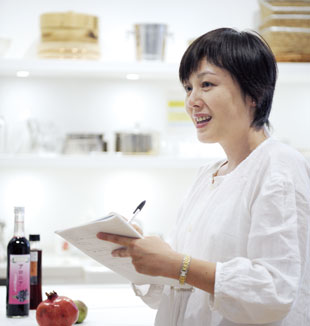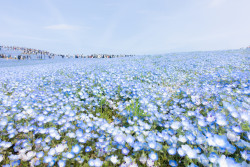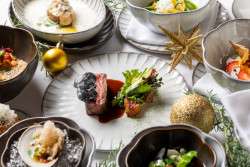
Originally published on metropolis.co.jp on September 2009

Photos courtesy of Junko Nakahama
Some people become food writers because they love to eat, others because they love to write. For Junko Nakahama, her career came about as a matter of necessity. While studying American literature in the US in the mid-’80s, the Hokkaido native fell in love with the Long Island, New York area, and decided she wanted to stay. Her parents had other ideas, however, and told her she would have to make do without their help. So Nakahama supported herself by writing travel articles, then gradually shifted her focus to food and wine. After taking cooking classes and attending wine school, she won accreditation from the Japan Sommelier Association. Now back in Japan, she writes restaurant reviews, winery reports and dining stories for a variety of magazines, with a special focus on the shitamachi area of Yanesen; she also organizes English guided tours of the neighborhood called Omiyage Concierge. “I respect cuisine and ingredients which express the homeland and craftsmanship of the producers,” she says. Here are her recommendations for tasting the terroir of Tokyo.
Because I write so many restaurant reviews, I often eat two lunches and two dinners a day. So on a free night, I like to have a light meal of vegetables and fish with a glass of natural and gentle wine. Tabegotoya Norabo is a sacred place for veggie lovers. Chef Makio Akemine visits farms every morning and recreates their scenery in his dishes. I am so happy to fill my body with such healthy and beautiful vegetables. Aizbar is a small wine bar owned by a female chef named Ai Eto who selects wonderful American wines. She has over 80 varieties of vegetables on the menu every night; her signature dish is a salad with more than 30 greens, herbs, root vegetables and traditional Japanese veggies. She prepares each vegetable individually—for example, udo (a mountain plant which produces fat, white, edible stalks) is dipped in vinegared water, and renkon is marinated in champagne vinegar. She offers seasonal fish like lightly grilled mackerel, and her cooked vegetable dishes and risotto are also excellent. Chinese restaurant Wasa is a new addition to my list. Owner-chef Masataka Yamashita apprenticed at well-known Kaika-tei in Gifu Prefecture. You can enjoy a menu full of vegetables and fish here—sautéed horse mackerel with a smoky flavor, sardines with Chinese pepper, eel with green beans and miso sauce. Yamashita doesn’t use artificial seasonings, so you’ll be surprised by the natural flavor and fresh aftertaste of these dishes. I often go to the cozy family-owned restaurant Ocha to Gohan-ya with my non-Japanese friends. The father is a grand chef of fish, the mother cooks vegetable dishes, and the daughter does the desserts and the interior decorating. There are around 15 dishes with steamed rice served in ohitsu (wooden containers), with miso soup, at very reasonable prices.
When I’m having a private dinner, I drink only all-natural wines. Uguisu is the most popular wine bar in Tokyo now. All the wine on the list is “bio,” and you can have most of them by the glass at unbelievably reasonable prices. Makoto Konno, the owner-chef, prepares the traditional French cuisine with a nicely casual taste. His salad with 15 vegetables and couscous is my favorite. La Nuit Blanche is a small wine bar owned by Toshinaga Haba, who introduces each wine by telling the story behind it. The authentic Italian cuisine is much more delicious than wine-bar standard. Yamariki just might be the most inexpensive wine bar in Tokyo. In fact, it opened 58 years ago as an izakaya, but the third-generation owner has trained as a French chef and the manager is a certified sommelier. They have a good selection of natural wines, and the pours are extremely generous (Yamariki is undergoing renovation until December; until then, visit the nearby annex). Méli-Mélo is a cozy restaurant with casual French cooking and an excellent selection of wines. Owner-chef Yasuo Munakata apprenticed in France for five years and selects the wines himself. Bistrot Vivienne, owned by a charming lady named Junko Saito, has a good selection of natural wines, too. The energetic atmosphere is also nice.

Méli-Mélo
Nodaya is one of my favorite wine shops. Kouhei Sato, who runs the store with his parents and wife, has a huge knowledge of natural wines and is a great supporter of Japanese producers (above). He holds a monthly casual wine party with the customers and invites producers as well. It is a wonderful occasion to exchange observations with the person who made the wine. Nodaya also sells traditional Japanese seasonings like shoyu, mirin, katsuobushi, etc. I drop by the delicatessen Atelier de Mannebiches whenever I am tired from work and don’t want to cook. They offer French home cooking like quiche, paté, caviar d’aubergine and delicious desserts. My favorite bakery-cafe is Konohana, owned by a pair of pretty young sisters: Mayumi bakes a variety of breads using natural yeast and organic ingredients, and Megumi is in charge of drinks. I have attended their baking class and enjoy baking by myself now.

Nodaya
Unfortunately this might be difficult for readers to take advantage of, but my favorite chef is Hitoshi Kakizawa, who teaches my Japanese cooking class. Although it is a hands-on class, he sometimes cooks himself and offers a traditional kaiseki course to us. Kakizawa is the second-generation chef of a kappo restaurant named Tsuruju in Toranomon. It closed about five years ago and since then he’s been introducing his technique and philosophy to students. The summer course menu the other day was goma tofu (paste made of ground sesame), hamo-chiri (boiled conger pike served sashimi style), sardines with Japanese plum sauce, rice with sliced sea bream dipped in a sesame sauce, and more. The courses were beyond delicious and made us happy!
Address Book
- Omiyage Concierge Tours on Oct 17 & 24. ¥500 per person, includes map. Email jun-nakah@pop12.odn.ne.jp or see their homepage for more info.
- Aizbar 2F, 2-26-5 Kami-Osaki, Shinagawa-ku. Tel: 03-5434-0117. Open 6pm-1am, closed Sun. Nearest stn: Meguro.
- Atelier de Mannebiches 1-2-2 Nishi-Kata, Bunkyo-ku. Tel: 03-5804-4242. Open Wed-Mon 10am-8pm, closed Tue. Nearest stn: Kasuga (Mita line).
- Bistrot Vivienne 4-13-19 Ginza, Chuo-ku. Tel: 03-6273-2830. Open Mon-Sat 6-10pm, closed Sun & 3rd Mon. Nearest stn: Ginza or Higashi-Ginza.
- Hitoshi Kakizawa’s Cooking School www.kakizzawa.com
- Konohana 3-25-6 Asakusa, Taito-ku. Tel: 03-3874-7302. Bakery open Tue-Sat 10:30-6pm, café from noon, closed Sun-Mon & 3rd Tue. Nearest stn: Asakusa. http://mayupan358.exblog.jp
- La Nuit Blanche B1, 7-2-8 Ginza, Chuo-ku. Tel: 03-6909-9561. Open Mon-Sat 6pm-3am, closed Sun. Nearest stn: Ginza.
- Méli-Mélo 4-5-4 Iidabashi, Chiyoda-ku. Tel: 03-3263-3239. Open Mon-Fri 11:30am-3pm & 6pm-midnight, Sat & hols noon-4pm & 5-11pm, closed Sun. Nearest stn: Iidabashi.
- Nodaya 3-45-8 Sendagi, Bunkyo-ku. Tel: 03-3821-2664. Closed Wed. Nearest stn: Sendagi or Nishi-Nippori. www.e-nodaya.com
- Ocha to Gohan-ya 3-42-8 Sendagi, Bunkyo-ku. Tel: 03-5814-8131. Open Mon-Sat 11:30am-2pm & 5-8:30pm, closed Sun. Nearest stn: Sendagi .
- Tabegotoya Norabo 4-3-5 Nishiogi-Kita, Suginami-ku. Tel: 03-3395-7251. Open Tue-Sun 5pm-midnight, closed Mon. Nearest stn: Nishi-Ogikubo (Chuo line).
- Uguisu 2-19-6 Shimo-Uma, Setagaya-ku. Tel: 050-8013-0708. Open Tue-Sat 6pm-2am, Sun 6pm-1am, closed Mon & 4th Tue. Nearest stn: Sangenjaya. http://cafe-uguisu.com
- Wasa 3-6-22 Yakumo, Meguro-ku. Tel: 03-3718-2232. Open Thu-Tue noon-2pm & 6-10pm, closed Wed & 1st & 3rd Thu. Nearest stn: Toritsu-Daigaku. http://wasa.main.jp/index.html
- Yamariki Annex 1-14-6 Morishita, Koto-ku. Tel: 03-5625-6685. Open Mon-Sat 5-10pm, closed Sun & hols. Nearest stn: Morishita. www.yamariki.com







